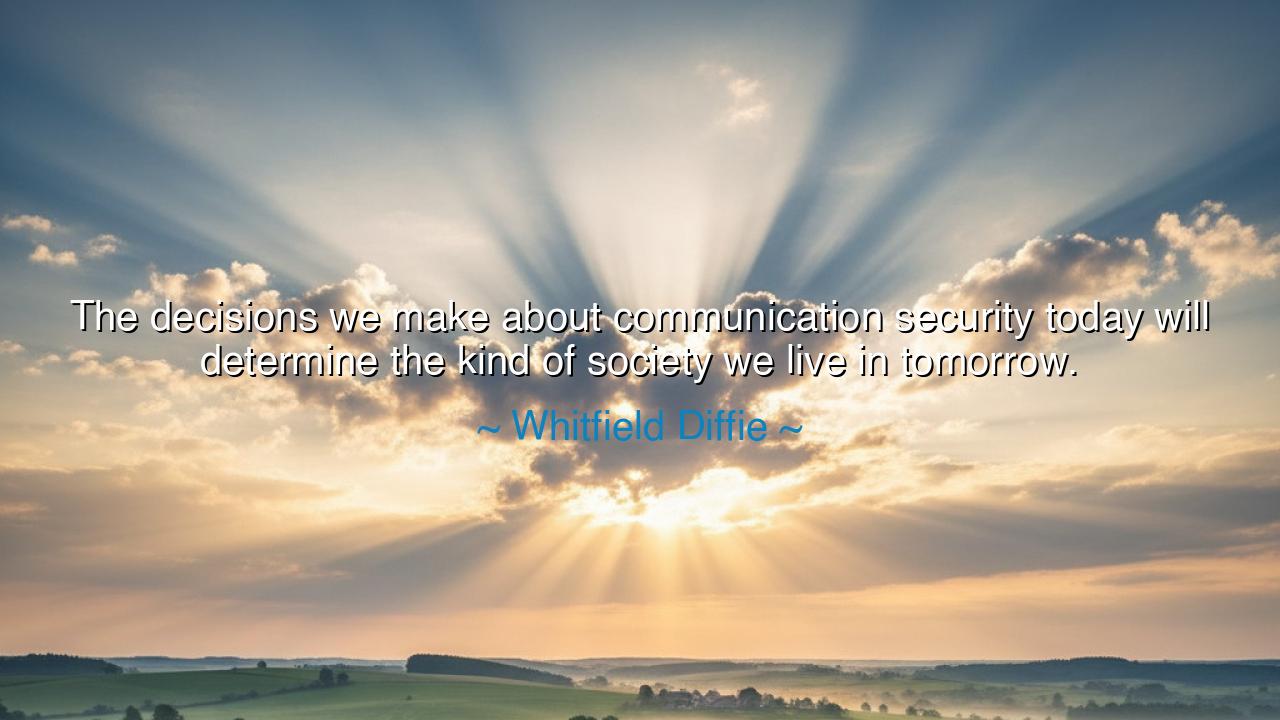
The decisions we make about communication security today will
The decisions we make about communication security today will determine the kind of society we live in tomorrow.






Host: The room felt quiet, the evening light now dimming as the world outside transitioned into night. Jack sat at the table, a cup of tea resting in front of him, deep in thought. Jeeny stood near the window, her arms loosely folded, looking out at the street, absorbed in the gravity of Whitfield Diffie’s words.
Jeeny: “I’ve been thinking about what Whitfield Diffie said: ‘The decisions we make about communication security today will determine the kind of society we live in tomorrow.’ It’s such an important statement, isn’t it? The idea that the choices we make now, especially in how we protect our communication and information, will shape the future of society.”
Jack: “Yes, it’s fascinating. Diffie is showing us that security isn’t just a technical issue—it’s a societal issue. How we choose to secure our communications today will affect everything from personal privacy to how power is distributed. Security plays a pivotal role in ensuring that we live in a world where freedom, trust, and democracy can thrive, rather than be undermined.”
Jeeny: “Exactly. The way we approach communication security now will affect the structure of society in ways we can’t always predict. If we allow surveillance and data breaches to become normalized, it will erode our privacy, our trust in institutions, and even our basic freedoms. On the other hand, if we prioritize secure communication, we can create a society where individual rights are protected, and where people feel safe to express themselves without fear of being monitored or exploited.”
Host: The stillness in the room deepened as the weight of their conversation settled. Jack’s fingers lightly rested on the edge of his cup, his thoughts focused inward, reflecting on the long-term consequences of decisions that seem so immediate today.
Jack: “It’s almost like we’re at a crossroads, isn’t it? The decisions we make now about data privacy, surveillance, and communication security will lay the foundation for the kind of future we’ll have. If we take security seriously, we can ensure a future where information flows freely but remains protected. But if we ignore it, we risk creating a world where control and manipulation take over, where trust is undermined.”
Jeeny: “Yes, and I think Diffie is pointing out that the choices we make aren’t just about technology—they’re about values. It’s not just about choosing which tools or platforms to use, but about deciding what kind of society we want to build. Do we want to live in a world where information is open but secure, where we have control over our own data? Or do we want to live in a world where our privacy is compromised, where our communication is monitored, and where the balance of power is tipped in favor of the few who control it?”
Jack: “Exactly. The future of society depends on the balance we strike between security and freedom. We need to ensure that while we protect our communications and data, we don’t create a society where fear and control take over. It’s about finding ways to protect people’s privacy without sacrificing the freedom of expression and the openness of communication.”
Jeeny: “And the challenge is that these decisions are happening now—right under our noses. We’re living in an age where the decisions we make about technology and security will determine the direction we go in. Do we want to build a society that values privacy and openness, or do we want to build one that prioritizes control and surveillance? It’s a responsibility we all share.”
Host: The quiet in the room deepened as the conversation unfolded. The realization that communication security is not just a matter of technology, but of the society we want to create, had settled into a shared understanding. Jack’s fingers rested on the table, and Jeeny’s gaze softened, reflecting on the long-term impact of the choices we make today.
Jack: “So, in a way, Diffie is urging us to think about the kind of future we want. The security of our communications today shapes the world we’ll live in tomorrow—where privacy, freedom, and trust are either upheld or compromised.”
Jeeny: “Yes, it’s a call for awareness and action. We need to recognize the power of our decisions and take responsibility for the kind of world we’re creating. Communication security isn’t just a technical issue—it’s a societal issue that will determine the balance of power, trust, and freedom for generations to come.”
Host: The room felt still now, the weight of the conversation settling in the air. Whitfield Diffie’s words had sparked a deeper reflection on the role that communication security plays in shaping the future. The decisions we make today will determine not only how we protect information but also how we protect our values—privacy, freedom, and trust—in a world that is rapidly evolving. The world outside had grown darker, but inside, there was light—a quiet realization that the future is shaped not just by what we have today, but by how we choose to protect it.






AAdministratorAdministrator
Welcome, honored guests. Please leave a comment, we will respond soon